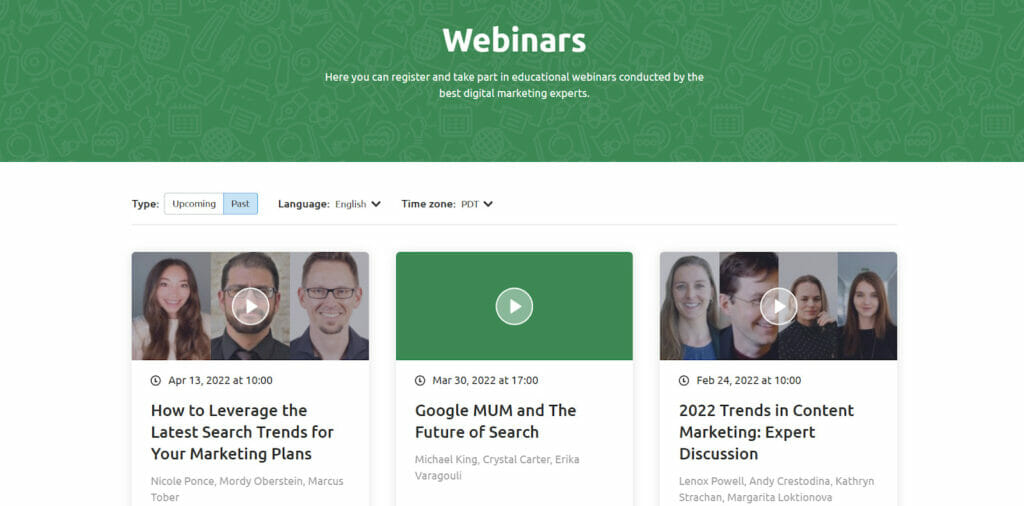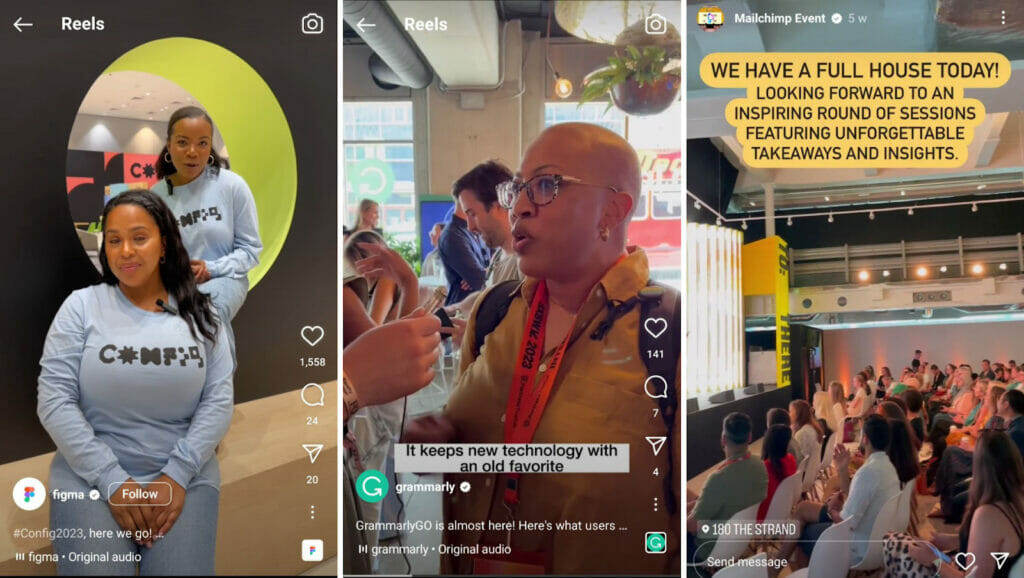The Power of Experiential Marketing: Leveraging Events to Engage and Inspire
Have you ever felt overloaded by colorful ads, marketing emails, notifications, and promotional posts? Modern marketing can feel impersonal and unconvincing when it all blurs together. Imagine what your customers must be feeling!
So how do you attract customers and inspire them to act? Through personalization and real-life experiences! Called experiential marketing, this approach hinges on creating interactive and emotional connections between brands and their target audience to drive results.
If you’re wondering how to get into experiential marketing, read on to understand the benefits of this strategy and examples of it at play. Soon, you’ll be ready to incorporate experiential marketing into your own organization’s strategy!
What is Experiential Marketing?

Experiential marketing is a promotional strategy that engages consumers through creating experiences. Doing so reinforces a brand’s value proposition in ways traditional ads can’t!
From pop-up shops to webinars, experiential marketing campaigns ensure a closer bond between the consumer and the brand by engaging them in memorable interactions. Your audience will remember your brand because of the great experiences they have with you!
Of course, experiential marketing is not only about the event or the experience itself but also about providing rich opportunities for content creation and social sharing. And nowadays, events and experiences are more popular than ever!
Did you know:
- According to Agency EA, 90% of B2B marketers and 70% of B2C marketers organized in person events in 2022
- In 2022, 33.5 million people attended a live show, compared to 27 million in 2019
- EventMarketer’s 2022 Experiential Intelligence Report found that 68% of B2C brands are more confident about the importance of marketing events than before the pandemic
- The same report also found that 65% of brands consider experiential marketing events to be related to sales success
Regardless of whether your organization focuses on B2B or B2C marketing, event and experiential marketing will take your marketing strategy to the next level!
What Are Some Experiential Marketing Examples?
The kind of experiential marketing activities you choose to organize can vary widely based on the industry, target audience, and marketing goals. In other words, the sky’s the limit!
Here are some examples of experiential marketing events you can turn to:
Classes, workshops, and webinars
These provide an opportunity for attendees to learn something new about your product or the sphere your product is associated with.
This option is perfect if your objective is to position your brand as an expert in the field and give participants a tangible skill or benefit to take away. For example, a company providing eCommerce optimization services can conduct a workshop on optimizing Magento 2 page speed.
Webinars are digital seminars that can be either live or pre-recorded. As a virtual option, they can reach a global audience and are cost-effective. The webinar format also allows for interactive elements like Q&A sessions, polls, and breakout rooms. Just keep in mind that your webinars will be easier to host with a proper virtual event platform.
Webinars can even be recorded for future use! Take the SEO platform Semrush, which has been hosting webinars on SEO tips. These webinars are available even if you don’t use the platform, so Semrush promotes their brand by conveying helpful information that’s available anytime, anywhere.

Pop-ups
These are temporary retail spaces or experiences that ‘pop up’ for a limited time. This is a great experiential marketing option if you sell physical products. The temporary nature generates a sense of urgency and excitement!
Pop-ups are often seen as exclusive and limited-time experiences, which can generate social media buzz. Translate that buzz into sales by planning them with your audience and goals in mind.
For example, location is important for these experiential marketing events! Choose an area your target audience frequents, like near a mall or shopping district. Or, extend your reach by organizing the sale in a city or town where you have followers but no permanent physical store. You’ll get customers flocking to your pop-up, especially if you offer exclusive or new products!
Product presentations
These events are specifically designed to showcase and introduce new products. They give consumers firsthand experience with a product before they decide to buy, allowing them to see, touch, and sometimes even taste or try the product in real-time.
Encourage your guests to share their experiences on social media, perhaps with a hashtag and photos! For added visibility on social channels, you can invite an influencer or two to join your presentation for an exclusive experience.
Contests
Who doesn’t love the chance to win a prize? Contests are an exciting way to engage your audience and spread brand awareness. To make the contest work for you, invite participants to answer questions about your brand or items as a condition of entry.
And if you’re looking to create additional hype for a virtual giveaway? Allow additional entries from your audience based on how many friends they tag on your posts!
Your team will be able to collect user information, feedback, and content from the entry phase. And the chance to win an experiential prize—especially if additional entries are as simple as liking and sharing or tagging on a post—will get your socials buzzing!
So how would an in person contest work? Irish beer brand Guinness presents a great example! Guinness ambassadors visited pubs throughout the United Kingdom while wearing flight attendant uniforms, offering the chance to win different prizes. The giveaways started with basic key chains, but the grand prize was a private jet vacation to Dublin. Now that’s an incentive!
6 Ways Experiential Marketing Improves on Traditional Marketing
If you’re new to experiential marketing, it might not be immediately clear what benefits it can offer compared to your other marketing strategies. You might even be wondering how to measure experiential marketing impact!
Most ads, both online and offline, rely on explicit messaging and visuals to sell a product or service. Though effective in some contexts, these methods often miss out on building deeper, more emotional connections with consumers.
This is where experiential marketing truly shines!
Instead of simply telling consumers about a brand’s value, here are 6 ways experiential marketing demonstrates it:
1. Improves communication with your audience
Experiences are an effective way to create a positive and long-lasting impression. Events are all about connecting with attendee emotions, which are the beating heart of effective marketing.
Imagine the difference between seeing an ad for a product online vs. trying it at a real-life event that connected you with a like-minded community on top of an intriguing product presentation. Wouldn’t you feel more interested in a product or brand that you could engage with firsthand?
2. Provides unique content opportunities
According to Chaos Theory, 98% of event attendees generate digital content. Apart from the chance to score some high-quality user-generated content (UGC), experiential marketing provides the perfect occasion to create your own creative content!
Use your events as an opportunity to record how consumers and attendees interact with the experiences you design to sell your business. Post pictures, videos, and reels on your socials using custom hashtags to encourage other attendees to share more content!
Not only are you posting throughout your experiential event marketing, but you can keep these posts as content for future campaigns, branding, meetings, and other purposes. Check out how Figma, Grammarly, and Mailchimp use their experiential marketing events as a valuable source of social media content:

3. Fosters collaboration
Live events are also an opportunity to meet new people. Most of the time, such activities draw people with similar interests, careers, or pain points.
For instance, a company promoting its SEO tool through a workshop will likely engage small business owners, digital marketing managers, copywriters, etc. Such an audience may not only share SEO insights but also find collaboration and employment opportunities. When a community forms because of you, that’s a great recurring audience for your future events!
4. Helps create a desirable impression
Positioning is a crucial aspect of any company’s image. In traditional marketing, it’s associated with such instruments as tone-of-voice, design, ambassadors, etc.
Experiential marketing is a way to either make a particular image even more stable or to take a bold new direction. It’s up to you to decide on the kind of event you run and to set a matching mood. Be it a formal and professional class or a fun and cheerful contest, your event can leave a strong impression with proper planning!
5. Inspires UGC and word-of-mouth promotion
People usually share their good experiences with others. So after visiting a good event, you can be sure word-of-mouth will do its job!
We’ve already mentioned the potential for experiential marketing to produce user-generated content. When your attendees share UGC images and videos online, they’re effectively promoting the event (and your brand!) to their followers. The built-in promotion ensures broader recognition, a higher level of trust, and a wider audience for upcoming events.

6. Provides valuable insights
Collecting data for experiential marketing might range from analyzing post-event surveys to using demographic data from registration. The most effective marketing strategies examine the available data and use it to segment consumers, personalize experiences, deal with problems or recommendations, and assess efficiency.
Experiential Marketing Best Practices
Defining goals and choosing the right strategy is only half the story! Once you’ve decided on the basics, it’s time to start organizing. Here are some tips to make the process easy for your team and maximize ROI.
Integrate social media
It should come as no surprise that social media reach plays an integral role in experiential marketing!
By using hashtags, competitions, and giveaways, you can attract people to your events and encourage attendees to share updates on their socials as well. This way, you win new customers and benefit even after your event is over.
Combine different kinds of activities
Experiential marketing strategies may be blended to produce a perfect campaign for your objectives. Why not organize a professional contest where the top prize is a speaking opportunity at a workshop, for instance? This would help you engage a knowledgeable audience and let them exchange valuable experiences.
Plus, combining different types of activities into a single experiential campaign allows you to create a truly unique experience.
Utilize storytelling
Every brand has a story. And the more your story resonates, the more relevant it’ll feel to your audience! Just like with other marketing strategies, you should focus on the narrative you want to tell and the takeaway message you want your audience to receive from your event.
Use a dedicated app
When you’re creating a memorable event, you’ll want a reliable tool to make planning easier. A tailored event app can help you create long-lasting relationships with your audience by:
- Supporting your pre-event marketing
- Providing clear event information at attendees’ fingertips
- Boosting networking opportunities
- Collecting feedback through live polling and questionnaires
- Reflecting your branding in its design
- And more!
If you’re ready to use an event app at your next experiential marketing event, check out EventMobi’s features to see how they can support your event!
Connect remote attendees
Events can unite people with similar life experiences and passions! But we’ve all learned how hard networking can be, especially during online events.
Build in opportunities to network at your event and use networking tools that facilitate connection with features such as:
- Personal profiles
- Appointment booking
- 1-to-1 private chat
- Group discussions
When you support these connections, you can offer attendees a meaningful experience with lasting relationships. And that can mean a lasting relationship with your brand, too!
Creating Your Next Experiential Event
As technology improves and consumers crave more new and personalized experiences, businesses will want to develop increasingly immersive and engaging events. You can expect to see emerging technologies like virtual reality and augmented reality used more frequently in experiential marketing efforts!
Of course, experiential marketing can have a more limited audience compared to traditional marketing. One-on-one engagement is the ideal strategy for ensuring that the consumer has the whole experience, which implies that you can only focus on a specific group of customers at once.
But with the right marketing personnel and a hands-on approach to customer service, experiential marketing makes for an excellent marketing strategy. Make the extra effort with the right tools, and you’ll soon be forging more genuine human relationships with your customers as your brand’s star rises!
Recommended Resource: Looking to create an experiential marketing event? 🌟 We’ve got you covered with our experience design guide!
This post was contributed by Kate Parish, CMO at Onilab, an eCommerce development agency.